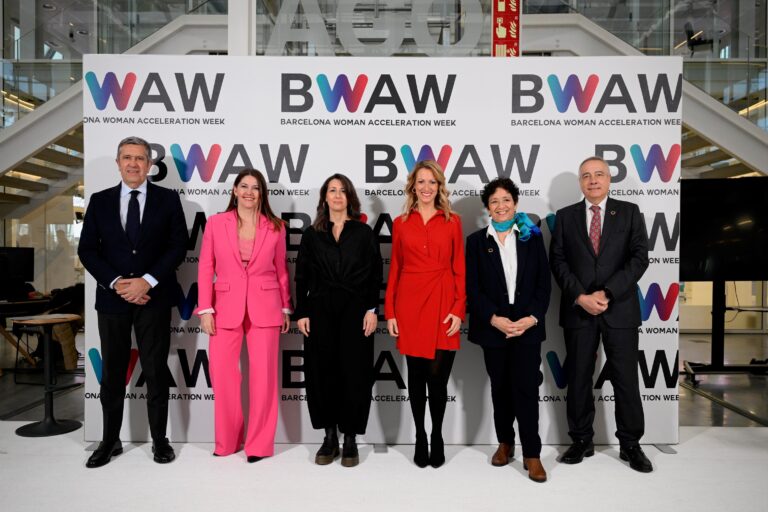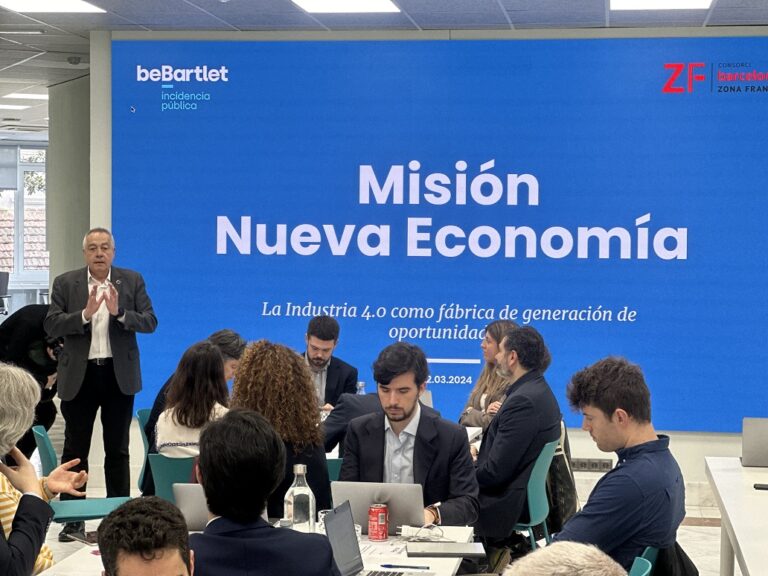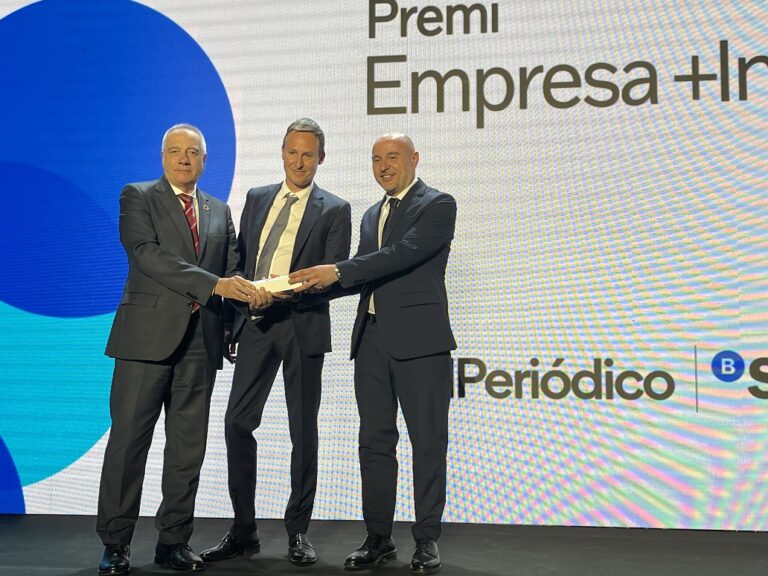Gay assures that BWAW is “a necessary event to advance towards gender equality

Inauguracion BWAW
5 de March de 2024
- The Second Deputy Mayor and Councillor for the Àrea de Drets Socials of Ajuntament de Barcelona, Maria Eugènia Gay, presided over the opening ceremony of the 4th edition of BWAW, which was also attended by the Undersecretary of Finance of the Ministro de Hacienda y Función Pública, Pilar Paneque; the Secretary General of the Departament d’Igualtat i Feminismes of the Generalitat de Catalunya, Georgina Oliva; the special delegate of the State in the CZFB, Pere Navarro; the general director of the Fundación Incyde, Javier Collado; and the general director of the CZFB, Blanca Sorigué
- Organised by the Consorci de la Zona Franca de Barcelona, this benchmark event to move towards real parity in the business world has 67 speakers and a total of 14 sessions in this edition.
Barcelona, March 5, 2024.– The fourth edition of the Barcelona Woman Acceleration Week (BWAW) began today, consolidating itself as a benchmark event in terms of equality in the business environment. Today’s conference highlighted the challenges facing society and the business environment to accelerate towards real parity in key sectors of the economy, and in areas where women have been most underrepresented, such as industry.
The opening ceremony of BWAW was chaired by the Second Deputy Mayor and Councillor Àrea de Drets Socials of Ajuntament de Barcelona, Maria Eugènia Gay, who was accompanied by the Undersecretary of Finance of the Ministro de Hacienda y Función Pública, Pilar Paneque; the Secretary General of the Departament d’Igualtat i Feminismes of the Generalitat de Catalunya, Georgina Oliva; the special delegate of the State in the CZFB, Pere Navarro; the general director of the Fundación Incyde, Javier Collado; and the general director of the CZFB, Blanca Sorigué.
The second deputy mayor, Maria Eugènia Gay, has stated that “we have a lot of challenges, that’s why initiatives like BWAW are very important. We charge 17% less and equality needs to be guaranteed. Establish synergies and move forward together. As women gain access to power, the barriers fall, so do the barriers”.
For her part, Blanca Sorigué stressed that “we are proud to be part of this initiative that seeks to transform the present and future of all women in the world, creating a space where female talent can exploit their full potential in equality, without bias of any kind”.
At the closing of the event, the special delegate of the State in the CZFB, Pere Navarro, said “we are living in a key moment to build a solid, bright and egalitarian future for all. From the entity we strongly advocate collaboration, transparency and activism to close the gap. We must address this issue together and without taboos, female talent is essential for economic and social development”.
Women in senior legal positions
Once the presentation was over, the different presentations that will take place today until Thursday, March 7 with 67 top-level speakers have begun. In this sense, the day began with the BLegal vertical and the panel discussion “The presence of women in senior legal positions” with the moderator Joan Roca, executive president of Roca Junyent and the top speakers: Sonia Gutiérrez, magistrate of the Consejo General del Poder Judicial; Susana Ferrer, vice-dean of the ICAB and Susana Sampedro, chief inspector in Polícia Nacional.
The figures introduced in the roundtable are crucial to understand the role of women in the legal sector: in Spain there are 5.3000 judges and magistrates, but only 3.000 of them are women; 60% of large law firms are represented by women, but only 20% are headed by women, and only 16% of the Policía Nacional force is female. To accelerate the role of women in these sectors, some ideas have been stressed, such as: the need for training, effort and pedagogy, the search for both male and female role models to understand that it is possible to reach high positions, and the need to put the imposter syndrome aside to progress in the professional career.
Female leadership in the public sector
Subsequently, the BWAW focused on the BPublic vertical and the presentation “Female leadership in the public sector” with Pere Navarro as moderator and the panel: Pilar Panque, Undersecretary of Finance in the Ministerio de Hacienda of the Gobierno de España; Esteve Crespo, director of RTVE Catalunya; Marta Elia, Secretary General of Transporte Terrestre, del Ministerio de Transporte y Mobilidad sostenible de España; and Catalina Grimalt, deputy director general de Organización y Recursos Internos in Port de Barcelona.
In the public sector there are more than 50% women, but in the State fleet, there are only 6% of female drivers. Legislative momentum, measures such as increasing the minimum wage and the creation of support networks are essential measures to increase women’s participation in these areas. In addition, the public administration is experiencing a moment of generational change, something that can be an opportunity to attract new female talent. In the case of RTVE, it has a firm commitment to equal treatment and opportunities, with an equality plan that is a benchmark in Spain and at European level, also ensuring parity in all its audiovisual content.
Challenges faced by women in Industry 4.0
The day progressed with the panel “Challenges faced by women in Industry 4.0” in the BIndustry 4.0 panel itself. Blanca Sorigué acted as moderator on the panel of: Paulina Juárez, Senior Vice President of Kion Group; José Carlos Cabaleiro, CEO of AUSSA; Mireia Bonilla, Production Development Manager at Seat; Anna Sánchez, CIO & CDO, of Volkswagen Group Spain Distribution and Oriol Alcoba, General Director of Industry of the Generalitat of Catalonia.
As highlighted during the session, there is less than 25% female employment in the industry, there are 700.000 professional women for every 2 million men in the sector. And only 9% of women hold senior management positions as CEOs. If we also focus on new professionals, such as those related to AI, there is also an underrepresentation, as only 22% of women are dedicated to Artificial Intelligence.
One of the conclusions of the round table revolved around the new generations. There are still very few girls who are interested in technical engineering. We must set ourselves a goal of diversity, of richness of perspectives, to have more dynamic and collaborative environments. Another key factor has been the scarcity of talent in the sector; tpromote this area, training is essential, also in leadership and soft skills.
This afternoon the event will carry out the last vertical BMultilateral “Main priorities in the relationship of multilateralism”. By Anwar Zibaoui, General Coordinator of ASCAME and with the panel: Amaia Celaya, advisor in humanitarian practices, from the UN and EC; Rosa Cañadas, president of the Fundación Tanja; Mercè Conesa, CEO of Barcelona Global; and Teresa Pedrosa, Labour and Social Security Inspector in A Coruña of the Government of Spain.
Tomorrow, 6 March, the event will deal with gender perspectives in audiovisual production; female leadership in HR; retraining as a second chance; the promotion of parity policies from large corporations and connectivity in the world from a gender perspective.


